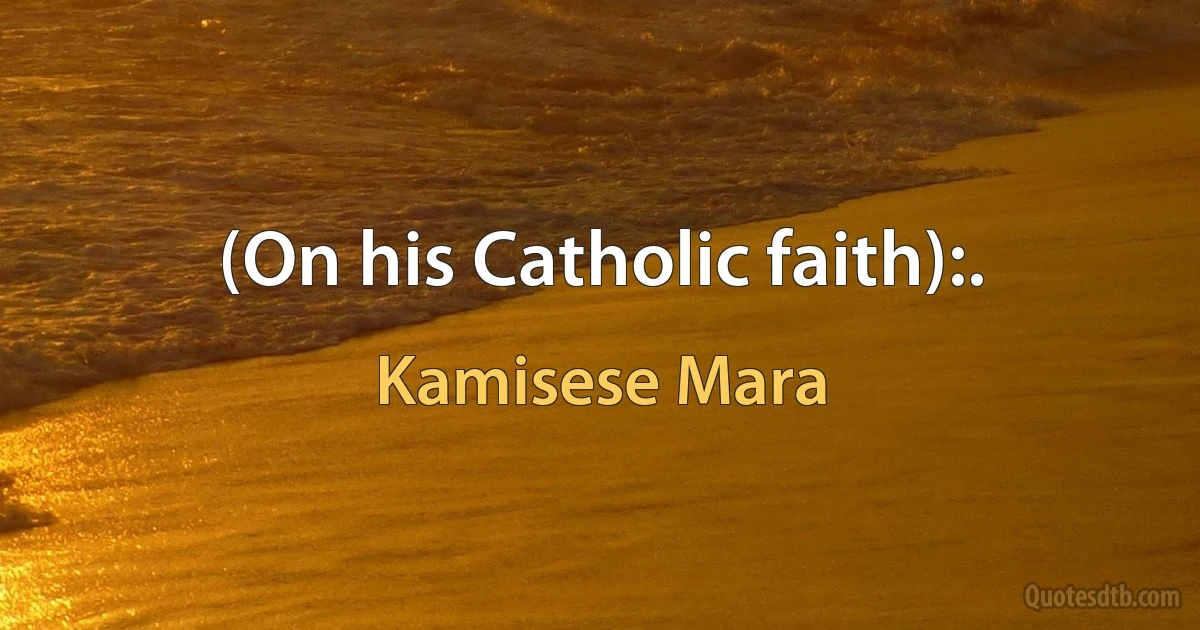Catholic Quotes - page 29
The most authentic Catholic ethic, monastic asceticism, is an ethic of eschatology, directed to the salvation of the individual soul rather than to the maintenance of society. And in the cult of virginity may there not perhaps be a certain obscure idea that to perpetuate ourselves in others hinders our own personal perpetuation?

Miguel de Unamuno
Any public committee man who tries to pack the moral cards in the interest of his own notions is guilty of corruption and impertinence. The business of a public library is not to supply the public with the books the committee thinks good for the public, but to supply the public with the books the public wants. ... Censorship ends in logical completeness when nobody is allowed to read any books except the books that nobody can read. But as the ratepayer is mostly a coward and a fool in these difficult matters, and the committee is quite sure that it can succeed where the Roman Catholic Church has made its index expurgatorius the laughing-stock of the world, censorship will rage until it reduces itself to absurdity; and even then the best books will be in danger still.

George Bernard Shaw
Man's secret horror of his foot is one of the explanations for the tendency to conceal its length and form as much as possible. Heels of greater or lesser height, depending on the sex, distract from the foot's low and flat character. Besides the uneasiness is often confused with a sexual uneasiness; this is especially striking among the Chinese who, after having atrophied the feet of women, situate them at the most excessive point of deviance. The husband himself must not see the nude feet of his wife, and it is incorrect and immoral in general to look at the feet of women. Catholic confessors, adapting themselves to this aberration, ask their Chinese penitents "if they have not looked at women's feet.

Georges Bataille
Raised as a Roman Catholic, I internalized the social values of that faith and still hold most of them, even though its theology no longer persuades me. I have no quarrel with what anyone else subscribes to; everyone deals with these things in his own way, and I have no truths to impart. All I require of a religion is that it be tolerant of those who do not agree with it. I know a priest whose eyes twinkle when he says, "You go about God's work in your way, and I'll go about it in His.”.

Roger Ebert
The fight for ideals can no longer take the form of fight between nations, because the lines of division on moral questions are within the nations themselves and intersect the political frontiers. There is no modern State which is completely Catholic or Protestant, or liberal or autocratic, or aristocratic or democratic, or socialist or individualist; the moral and spiritual struggles of the modern world go on between citizens of the same State in unconscious intellectual cooperation with corresponding groups in other states, not between the public powers of rival States.

Norman Angell
His conflict with the Catholic Church arose because deep in his heart Galileo was a believer. There was for him no path of compromise, no way to have separate secular and theological cosmologies. If the Copernican system was true as he believed, what else could Galileo do but fight with every weapon he had in his arsenal... to make his Church accept a new system of the universe. ...In the contrast between Galileo's heroic stand when he tried to reform the cosmological basis of orthodox theology and his humbled, kneeling surrender when he disavowed his Copernicanism, we may sense the tremendous forces attendant on the birth of modern science.

Galileo Galilei
Fascism, like socialism, was rooted in a market society that refused to function. Hence, it was worldwide, catholic in scope, universal in application; the issues transcended the economic sphere and begot a general transformation of a distinctively social kind. It radiated into almost every field of human activity whether political or economic, cultural, philosophic, artistic, or religious. And up to a point it coalesced with local and topical tendencies. No understanding of the history of the period is possible unless we distinguish between the underlying fascist move and the ephemeral tendencies with which that move fused in different countries.

Karl Polanyi
Nothing is easier than to falsify the past. Lifeless instruction will do it. If you rob it of vitality, stiffen it with pedantry, sophisticate it with argument, chill it with unsympathetic comment, you render it as dead as any academic exercise. The safest way in all ordinary seasons is to let it speak for itself: resort to its records, listen to its poets and to its masters in the humbler art of prose. Your real and proper object, after all, is not to expound, but to realize it, consort with it, and make your spirit kin with it, so that you may never shake the sense of obligation off. In short, I believe that the catholic study of the world's literature as a record of spirit is the right preparation for leadership in the world's affairs, if you undertake it like a man and not like a pedant.

Woodrow Wilson
For as long as there are human beings, there will be prejudice. We are wired that way. It is impossible for most Americans to detect any difference at all between Serbs and Croats, but these ancient rivals very much see the difference between themselves. I could not detect the difference between an Ulster Protestant and an Ulster Catholic, but men have killed each other over that difference, until fairly recently, and, God forbid, may do again.

Rod Dreher
"Do you believe in the civic religion of America?” Think of it like this: how could the Catholic Church hold itself together if a significant number of Catholics decided that Jesus Christ, St. Peter, and St. Paul were villains? It couldn't. A nation is not a religion, but it has to hold its founders in esteem - and this is especially true of America, which was not founded on a tribe, as most other nations were. You don't have to believe that Washington, Jefferson, and the Founders were without sin - of course they weren't - but you do have to believe that what they did was good, even heroic. Certainly not villainous.

Rod Dreher
He [Nicolas Malebranche] cannot give up the principles which the Catholic Church imposes on him. He carries forward that process of rationalisation in Christian ethics which Descartes began, and which, like the attempt to restore an older theology, finds its fulfilment in Spinoza. It is Spinoza who is the first to create a wholly metaphysical ethics, free from all trace of its theological origin. Spinoza thus completes for continental ethics the separation between morality and religion which English empiricism, in spite of many relapses, had effected under the leadership of Bacon.

Baruch Spinoza
You compare Cardozo with Spinoza; but as far as I can judge by your book there is no intellectual comparison. Spinoza was not soft. I have been all my life long a fervent disciple of Spinoza precisely on account of his firmness, of his uncompromising naturalism. Yet even he leaves out the three traditions which, however false their cosmology, seem to me morally sound: the Greek, the Catholic, and the Indian. I am therefore not a disciple of Spinoza in his ideal of human life: It leaves out poetry, art, traditional religion, military and constructive patriotism. His society would be a tame society, where there would be no masters, but all would be voluntary slaves. Perhaps you feel something of my difficulty when you point out that "art" is an indispensable ingredient in everything human.

Baruch Spinoza
Because of the central importance in Luther's thought of individual reading of the Bible, Protestantism encouraged literacy, not to mention printing, and these two things unquestionably encouraged economic development (the accumulation of ‘human capital') as well as scientific study. This proposition holds good not only in Prussia but also all over the world. Wherever Protestant missionaries went, they promoted literacy, with measurable long-term benefits to the societies they sought to educate; the same cannot be said of Catholic missionaries prior to Vatican II.

Niall Ferguson
I think there is in this country a war on religion. I think there is a desire to establish a religion in America known as secularism. And I know that, based on reports, that the Obama administration gave this a lot of thought – a lot of discussion. This was not some little side issue that no one thought about. They gave it a lot of thought, and they decided to say that in this country that a church - in this case, the Catholic Church - would be required to violate its principles and its conscience and be required to provide contraceptives, sterilization, and morning after pills to the employees of the church. And that came as a shock. As I think it was Mike Huckabee said, "We are now all Catholics." Those of us who are people of faith recognize this is - an attack on one religion is an attack on all religion.

Mitt Romney
An agnostic is a doubter. The word is generally applied to those who doubt the verity of accepted religious creeds of faiths. Everyone is an agnostic as to the beliefs or creeds they do not accept. Catholics are agnostic to the Protestant creeds, and the Protestants are agnostic to the Catholic creed. Any one who thinks is an agnostic about something, otherwise he must believe that he is possessed of all knowledge. And the proper place for such a person is in the madhouse or the home for the feeble-minded. In a popular way, in the western world, an agnostic is one who doubts or disbelieves the main tenets of the Christian faith.

Clarence Darrow
I believe in intellectual hospitality. I love men that have a little horizon to their minds -- a little sky, a little scope. I hate anything that is narrow and pinched and withered and mean and crawling, and that is willing to live on dust. I believe in creating such an atmosphere that things will burst into blossom. I believe in good will, good health, good fellowship, good feeling -- and if there is any God on the earth, or in heaven, let us hope that he will be generous and grand. Do you not see what the effect will be? I am not cursing you because you are a Methodist, and not damning you because you are a Catholic, or because you are an Infidel -- a good man is more than all of these. The grandest of all things is to be in the highest and noblest sense a man.

Robert G. Ingersoll
..as is also another [painting] of Diana, who, bathing in a fount with her Nymphs, transforms Actaeon into a stag.. ..He also painted Europa passing over the sea on the back of the Bull. All these pictures are in the possession of the Catholic King, held very dear for the vivacity that Tiziano has given to the figures with his colors, making them natural and as if alive. It is true, however, that the method of work which he employed in these last pictures is no little different from the method of his youth, for the reason that the early works are executed with a certain delicacy and a diligence that are incredible, and they can be seen both from near and from a distance, and these last works are executed with bold strokes and dashed off with a broad and even coarse sweep of the brush, insomuch that from near little can be seen, but from a distance they appear perfect.

Titian
Rembrandt was already deeply involved in his attachment to Rubens - at once adopting him as his model and fighting to have the differences noticed. His [painting] 'Descent from the Cross', also painted in 1631 for the Stadholder, was directly taken from the engraving after Rubens's greatest masterpiece in Antwerp Cathedral', while at the same time being a calculated Protestant response to the immense diapason of the [catholic] Flemish master's altar-piece.

Rembrandt
My parents absolutely did not think of themselves as part of the Great Migration. They knew they were part of a great wave. No one really talked about it in those terms or gave it a name. I grew up surrounded by people who were from North Carolina, South Carolina, Georgia -- all around me. My parents' friends were all from there. They socialized with people from there. They were quite ambitious and competitive among themselves, bragging about that they were going to put their child through Catholic school because that was going to give them a better chance at succeeding...

Isabel Wilkerson



